
Registered Nurse (RN)
Registered Nurse (RN)
Amanda is a registered nurse with over a decade of experience in clinical nursing and a member of the Association of Healthcare Journalists.

November 30, 2022
Our editors have independently chosen the products listed on this page. If you purchase something mentioned in this article, we may
We’re guessing you’ve heard the term fight or flight, but did you know a little hormone called cortisol is responsible for this ancient biological response? Our bodies need a healthy production of cortisol in order to aptly respond to potential stressors, but it’s equally important that these levels go down when it’s time to relax. If this delicate balance isn’t right, it can cause a cascade of health issues. While you should always discuss symptoms with a medical professional, at-home testing for cortisol is a convenient way to discover these imbalances, and avoid unwanted symptoms.
To help you take control of your own stress response, we spoke with experts and researched the best at-home cortisol tests available today. Below, find our top picks that are the most accurate, easy to use, and a good value for your money.
A peek at the best at-home cortisol tests of 2022:
What is Cortisol?
Cortisol is a stress hormone produced by your adrenal glands. When someone is feeling stressed, their cortisol levels rise accordingly. Staci Holweger, founder of Lifepatches, defines cortisol as “A hormone that helps us adapt to stressful stimuli in our lives.”
Cortisol’s primary function is to convert protein into glucose, a form of energy. It does this by breaking down the protein in the liver and muscles, explains Daniel Boyer, M.D., of The Farr Institute. Glucocorticoid receptors are present in almost all tissues in the body. Because of this, cortisol is able to affect nearly every organ system: nervous, immune, cardiovascular, respiratory, reproductive, musculoskeletal, and integumentary.
This essential hormone regulates blood pressure, heart rate, energy levels, and metabolism. It’s released by our adrenal glands after stimulation by various stressors including physical illness, psychological distress and mental illness, and even lack of sleep. Cortisol levels that are too high or too low can cause unpleasant symptoms throughout the body.
High cortisol levels
Also known as cushing syndrome, producing too much cortisol hormone for an extended amount of time can cause the following symptoms (to name a few):
- Weight gain, especially around the face and abdomen
- “Buffalo hump” between the shoulders
- Stretch marks on the abdomen
- High blood sugar (hyperglycemia)
- High blood pressure (hypertension)
- Weak bones and muscles
- Acne
- Osteoporosis
- Anxiety, depression, panic disorder
- Insomnia
Low cortisol levels
Failure to produce enough cortisol, also known as Addison’s disease, is caused by an autoimmune reaction when your own body’s immune system attacks the cells in the adrenal glands, hindering the production of cortisol. Symptoms of low cortisol include (to name a few):
- Fatigue
- Weight loss
- Poor appetite
- Low blood pressure
- Salt cravings
- If severe enough, can cause reduced consciousness or delirium
- Hyperpigmentation of the skin
Treatment for these conditions is dependent on the cause, among other factors. Your own individual treatment plan should be discussed with your doctor.
Should you test your cortisol?
In many cases, yes, you should have your cortisol levels checked. According to Holweger, cortisol levels are most often tested when there has been a disruption in the circadian rhythm. Testing can also be done to check whether or not a patient has a tumor on the pituitary gland or any adrenal cancers.
If you’re feeling hyperactive, it may mean that your stress levels are affecting your brain function. Additionally, if you have a history of heart disease or suffer from chronic pain you should check to see if your cortisol levels are normal. Boyer adds that if you have been feeling stressed out, are having difficulty sleeping, or are experiencing lower energy than usual, you should test your cortisol levels.
Normal cortisol levels are based on the time of day. Cortisol levels peak in the early morning, and gradually decrease throughout the day, reaching their lowest point in the middle of the night. Because of this, when high cortisol levels or Cushing syndrome are suspected, cortisol levels are usually measured at night. If low cortisol levels or Addison’s Disease are suspected, cortisol levels are often measured early in the morning, as that is when cortisol levels should be naturally high.
Everyone’s baseline cortisol levels are different, but Cleveland Clinic defines normal cortisol levels as:
- Morning: 10 to 20 micrograms per deciliter (mcg/dL).
- Afternoon: 3 to 10 mcg/dL.
Should you discover that your cortisol levels are high, there are recommended foods to eat and supplements to take. As with all at-home testing, any abnormal results should be discussed with your healthcare provider, to create a treatment plan for your individual circumstances.
How to choose a cortisol test
There are three different methods to test cortisol levels.
Blood test: Taken first thing in the morning prior to eating or drinking, this will give you the most accurate but limited cortisol result when it should be at its highest.
Urinary free cortisol (UFC) test: Measures how your body is producing cortisol levels multiple times throughout the day.
Saliva sample: This non-invasive collection method provides detailed results of cortisol levels throughout the day.
The best testing method depends on your individual preferences. If you are looking for a less invasive method, choose the saliva or urine samples. However, for the most accurate results, a blood test is best—although it does not provide insight into how your body produces cortisol throughout the day.
How we picked:
The at-home test needs to be vetted by reviewers and use CLIA-certified labs.
The price point for at-home cortisol tests vary, so we included tests that will give the most value for your money.
No one likes to wait for results, so we considered turnaround time when selecting our top choices.
We included options for blood, urine, and saliva tests.
The best at-home cortisol tests of 2022:
Best blood test: LetsGetChecked
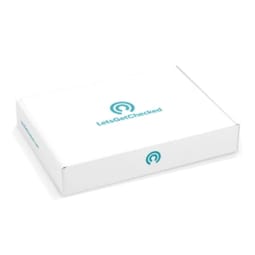
Pros:
- Simple one-time finger prick
- A medical professional will discuss results with you if they are abnormal
Cons:
- Only tests cortisol levels once in the morning
- Cannot take the sample on the weekend
Collection Method: Finger prick blood sample
Coverage: Not covered by health insurance, but you may use HSA or FSA account
Checks Levels Of: Cortisol
Result Time: 5 days
We’ve included LetsGetChecked on a number of our at-home testing roundups, and for good reason. The brand is reputable, gets great reviews, and offers over thirty at-home testing kits, including a blood sample for cortisol levels. One callout is that you cannot test during the weekends, because the results need to be sent in for evaluation right away.
LetsGetChecked uses CLIA-certified labs, so you’ll get the same level of accuracy as you would with a traditional doctor-ordered lab test. It’s recommended that you refrain from vigorous physical exercise the day before testing your cortisol levels. If your results are abnormal, you will get a call from a nurse who will walk you through an explanation. While this is a great perk, we still suggest discussing your results with your doctor as well.
Best urine test: Everlywell
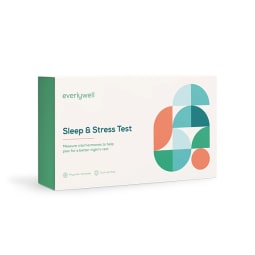
Pros:
- Four options for testing cortisol
- Well-known brand with great reviews
Cons:
- Extensive sampling method (4 samples throughout the day)
Collection Method: Urine sample 4 times during the day
Coverage: Not covered by health insurance, but you may use HSA or FSA account
Checks Levels Of: Cortisol, Cortisone, Melatonin, and Creatinine in the Sleep and Stress Test
Result Time: 5 to 7 days
Everlywell offers four options for testing cortisol levels: a Women’s Health Test, Men’s Health Test, Metabolism Test, and Sleep and Stress Test. The testing method is a bit extensive, with four samples needed throughout the day. It’s also worth mentioning that some people do find it difficult to transfer the urine into the sample tube with the provided pipette.
Keep in mind, the brand clearly states that users cannot test cortisol levels while taking an antibiotic medication. In addition, the instructions ask that you refrain from taking a biotin supplement within 3 days, for the most accurate results.
Best for fast results: myLABbox
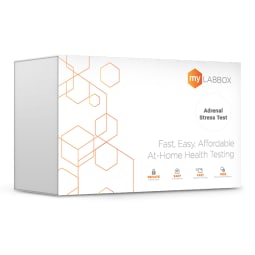
Pros:
- Quick turnaround time
- Free physician consultation with abnormal results
- Formulated for both men and women
Cons:
- Extensive sampling method (4 samples throughout the day)
- Does not accept insurance
Collection Method: Saliva
Coverage: Does not accept insurance but you can use HSA or FSA account
Checks Levels Of: CortisolDHEA
Result Time: 2 to 5 days
MyLABbox offers 8 tests that contain cortisol. This specific kit tests for cortisol and DHEA, another hormone produced by the adrenal glands. The brand uses both CLIA and CAP-certified laboratories to process its samples. Results will be returned in 2 to 5 days, which is the fastest of all our recommended kits.
If you cannot wait for the test to be mailed to you, myLABbox kits are available at select Walmart locations and on Amazon. After you receive your results, you have the option of discussing any abnormalities with a physician for free.
Best saliva test: Verisana
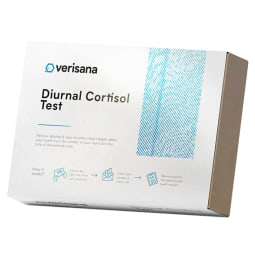
Pros:
- Non-invasive saliva sample
- Offers 7 different tests that include cortisol
Cons:
- Extensive sampling method (4 samples throughout the day)
- Does not provide individualized recommendations
Collection Method: Saliva
Coverage: Does not accept insurance but you can use HSA or FSA account
Checks Levels Of: Cortisol
Result Time: 3 weeks
Verisana boasts 7 tests that include cortisol, but the diurnal saliva test is what was used for this comparison. The non-invasive sample method requires a cheek swab four times a day to provide a comprehensive view of how your body is producing cortisol throughout the day.
Verisana does not offer any individualized recommendations for treatment if your results are abnormal, so you will need to discuss them further with your healthcare provider.
Best easy to use: ZRT Laboratory
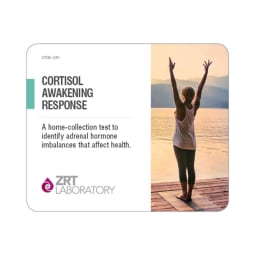
Pros:
- Non-invasive saliva sample method
- No middle man- ZRT is the lab processing the sample
Cons:
- Website is not very user-friendly
- Extensive sampling method (4 samples throughout the day)
Collection Method: Saliva
Coverage: Does not accept insurance but you can use HSA or FSA account
Checks Levels Of: Cortisol
Result Time: 5 to 7 days
ZRT is an international CLIA-certified lab based in Oregon state. While it’s not the most user-friendly, the brand’s website offers both direct-to-consumer tests and tests catered to healthcare professionals.
If you are diabetic, ZRT clearly states that you will need to discuss the testing method with your healthcare provider first. This will be the case with all saliva tests, as they are meant to be performed on an empty stomach, and diabetics typically need to eat upon awakening.
Another callout is that consumers in California will need to go through a different process for ordering any at-home testing kit, due to state regulations.
Best budget: RX Home Test
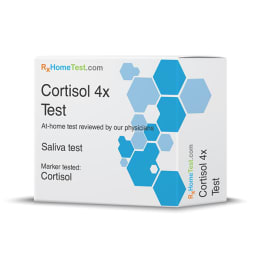
Pros:
- Can ship to Canada and Mexico
- Offers 4x a day or 2x a day saliva samples
Cons:
- Cannot ship to NY, NJ, MD, or RI
- No follow-up offered
Collection Method: Saliva 4x a day
Coverage: Does not accept insurance but you can use HSA or FSA account
Result Time: 5 days
While the website is less-than desirable when it comes to user-friendliness, RX Home Test has a quick turnaround time, with accurate results (using CLIA-certified labs). This is a saliva-based cortisol test, so it’s incredibly easy to conduct, with little room for user error.
RX Home Test does not offer any type of follow-up consultation, so you will need to discuss any abnormal results with your healthcare provider.
FAQ:
When should a cortisol test be performed?
Cortisol levels fluctuate throughout the day. Levels peak about 30 minutes after you wake in the morning and they gradually decrease. Cortisol levels hit their lowest point around midnight. When high cortisol levels or Cushing syndrome are suspected, cortisol levels are usually measured at night. If low cortisol levels or Addison’s Disease are suspected, cortisol levels are often measured early in the morning, as that is when cortisol levels should be naturally high.
Is saliva better than blood to test cortisol?
According to naturopathic doctor Ralph Esposito, serum (blood) cortisol testing is the least useful for monitoring cortisol levels. For those who suspect they may have high or low cortisol levels, the two best options are saliva and urine cortisol testing combined. Saliva testing within the first 90 minutes of waking up can be very helpful in measuring free cortisol or active cortisol. Salivary cortisol levels are thought to correlate with the levels of free cortisol in plasma and serum. Urine testing spread out over four points in the day (waking, late morning, evening, and before bed) gives the best idea of your total cortisol metabolic picture and pattern.
Can I test my cortisol levels at home?
Yes! Testing cortisol levels at home is quick, easy, and painless. These at-home testing kits come with all the supplies needed to perform a blood sample from a finger prick, a saliva sample from a cheek swab, or a urine sample. Each of our recommended brands use CLIA-certified labs, so you’ll get the same accuracy as with a traditional lab test.
The takeaway.
Stress is a normal part of everyday life. However, chronic stress can cause higher levels of cortisol for extended periods of time, which can be detrimental to your health. At-home cortisol tests are a convenient way to get a glimpse into these potential abnormalities. If you’re concerned about your cortisol levels, learn a few ways to keep things in check.

